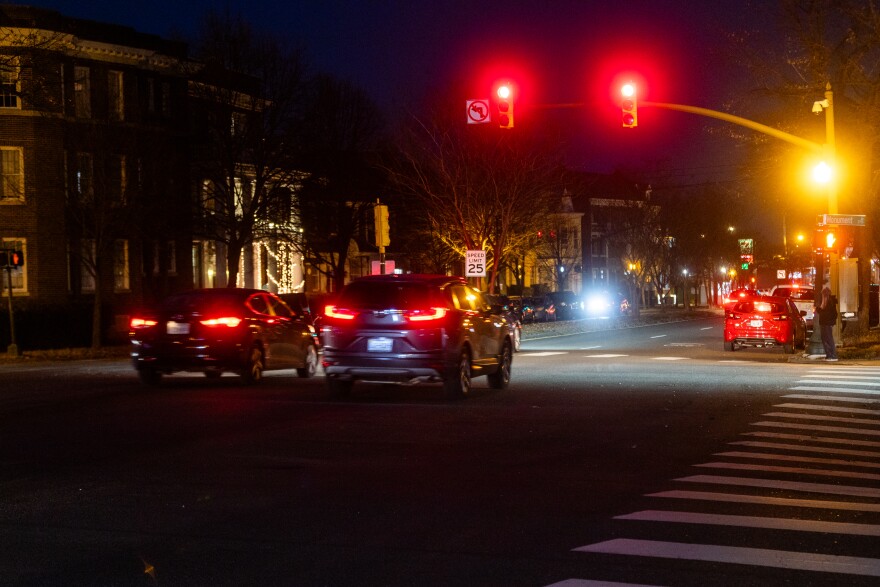To show the real-life way Virginia law restricts local government, former Richmond City Councilor Andreas Addison heads to the intersection of Arthur Ashe Boulevard and Monument Avenue.
As we stood on the corner, Addison — in the last days of his term on City Council — was interrupted by drivers running red lights.

“The problem is that people feel like they are able to get away with it, and there's no consequence,” he said, before pausing. “OK, that's red! See? Both cars, both directions.”
We spent about a half-hour on this corner, and every few minutes a driver would run a red light. Addison wants speed cameras here, but he says he can’t put them up without permission from the General Assembly, unless it’s a school zone.
The obstacle is a legal principle called the Dillon Rule, which makes it hard or actually illegal for localities to do lots of things. Rich Schragger, a professor at the University of Virginia Law School and an expert in local government law, said it comes up a lot.
“It’s basically a rule of judicial construction that says that any acts of local government have to be specifically authorized by the state Legislature,” he said.
The rule dates back to an 1868 ruling by John Dillon, a justice on the Iowa Supreme Court who was concerned about local officials being corrupt and passing unethical laws or inappropriately giving businesses public funds. In his opinion, Dillon determined localities only really exist because of their state legislatures.
“It breathes into them the breath of life, without which they cannot exist. As it creates, so it may destroy. If it may destroy, it may abridge and control,” he wrote.
A Virginia court first cited the rule in 1882, Schragger said. It was during a legal dispute over a Petersburg official’s salary. About a decade later, the Virginia Supreme Court cited the Dillon Rule when it found the city of Winchester didn’t have the authority to reward citizens for helping apprehend criminals. So, the Dillon Rule was repeatedly adopted over time through case law, not legislation or the state constitution.
In the 1960s and ’70s, many states either weakened the Dillon Rule or adopted “home rule,” which permitted localities to govern themselves.
As Virginia’s 1971 Constitution was being drafted, there was a proposal to adopt home rule. But it also came as the legal structures of segregation were meant to be dismantled in the home of Massive Resistance.
“I think there aren't smoking guns about the rejection of this particular amendment provision, but there is some suggestive history that surrounds the rejection of the home rule amendment,” said Schragger. “But one possible reason is — in the ’60s and ’70s — there were lots of issues about who would get to exercise power in our local governments, and particularly in our cities, and there were lots of issues surrounding race.”

Several Virginians answered VPM News’ call for their “favorite” examples of the Dillon Rule.
Virginians listed the ability to tax, set minimum wages, regulate addiction recovery housing and even things like regulating shopping carts or granting the ability of a firefighter to keep their helmet.
The Virginia Senate and House of Delegates’ local government committees hear dozens of bills every session granting localities authorities or changing their charters.
It’s at these meetings that people like Michelle Gowdy advocate for cities and towns as executive director of the Virginia Municipal League.
“We're constantly aware of things that are affected by the Dillon Rule,” said Gowdy. “Does it take up our time? Not as the words ‘Dillon Rule,’ but as the concept, often we spend time talking about things that localities can and can't do.”
This year, lawmakers are considering changing Portsmouth’s charter, repealing and replacing Danville’s charter, allowing localities to fine street vendors and establish “anti-rent gouging” authorities. Sometimes, but rarely, charter changes get caught up in party politics at the state level — like a change to Virginia Beach’s charter last year.
And there’s one bill that would allow cities and counties to adopt speed enforcement mechanisms — like cameras — just as Addison wanted.
On the first full day of hearings this General Assembly session, Gowdy spoke against a bill that would have made accessory dwelling units permissible. Generally, localities resist broad legislation like this.
“So, the VML position on that is very clear that we want our localities to decide at the local level what they look like,” she said. “We don't want the state to come in and say, you have to make all industrial in your town or all residential in your town. We want to be able to have the local citizens and the boards and commissions have that authority.”
The Virginia code is full of small provisions granting counties and towns special permissions.
Back at the intersection, Addison says he thinks — in some cases — cities should band together, act first and ask forgiveness instead of permission.
“If I get sued by the Attorney General because of breaking what the state charter says I can or cannot do ... I would love to have that day in court,” he said.
This story was produced as part of the VPM News series Curious Commonwealth.



